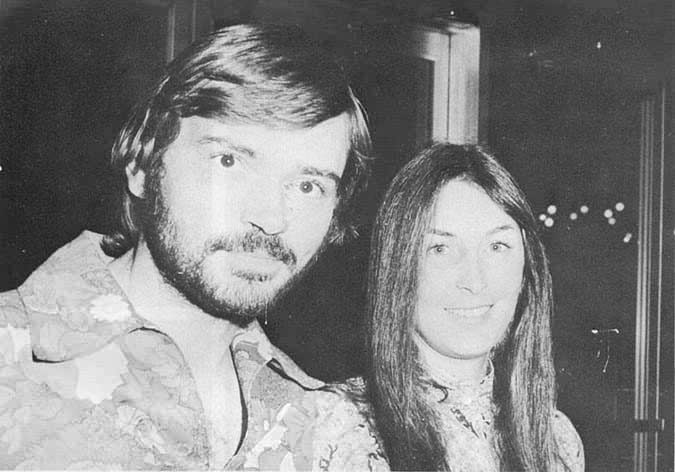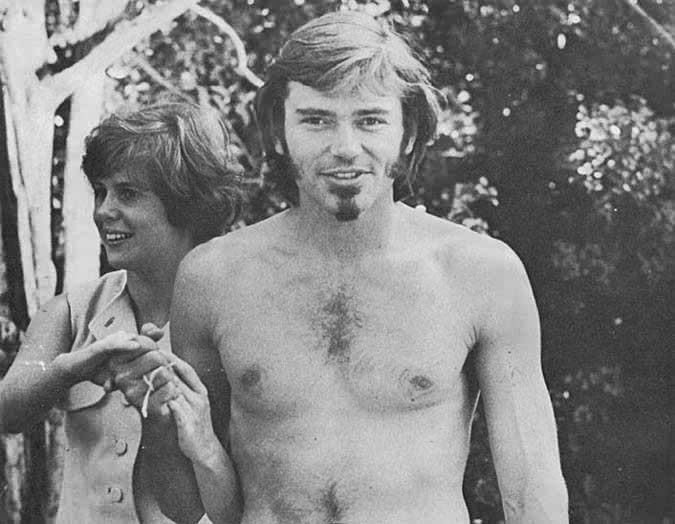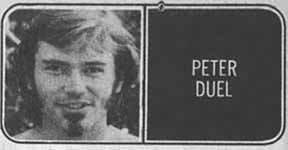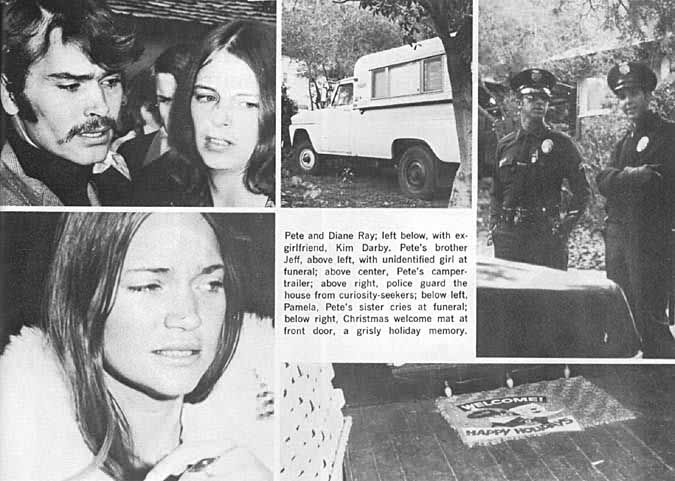- PETER DUEL: HE CARED TOO MUCH TO LIVE...
- by Morris Townsend
- Silver Screen, April 1972


It was like a bizarre tableau from a horror movie.
There was a shot. Diane Ray sprang out of bed and ran to the
living room. Her terror-filled eves found nothing upright--except
the still standing Christmas tree. Then she saw Pete crumpled
at the foot of the tree where only a few days earlier they had
shared the pleasant laughter of opening presents and exclaiming
over them.
Christmas was nice, they had agreed. In
fact, that was why the tree was still there on December 31. Throwing
the tree out would be like turning a loved one out into the streets.
So they let it stay; let its cheerfulness warm them a bit longer,
and prolong the peace and joy and fellowship that the holiday
was supposed to represent.
Besides, this was not one of those Christmas
trees that would end in ashes or be carted away in a dump truck.
It was a living tree, nurtured in water in Pete's living room,
and it would be nurtured in the soil around his rustic two bedroom
home in the Beachwood Village section of Hollywood Hills. Peter
Duel was no cocktail party ecologist. He lived ecology, breathed
it, and practiced it.
 Diane
screamed. A muffled, Oh-my-God, not-wanting-to-believe scream.
She faltered dizzily and the room began to swim. But somehow she
managed to reach the phone and call the police.
Diane
screamed. A muffled, Oh-my-God, not-wanting-to-believe scream.
She faltered dizzily and the room began to swim. But somehow she
managed to reach the phone and call the police.
It was almost 1:30 a.m., the last day
of 1971. And Peter Duel had chosen not to wait until midnight
to ring out the old year.
Or had he indeed chosen? A .38 calibre
revolver lay at his side. Had he meant to fire it or had if somehow
been an accident?
Had Peter Duel and Diane Ray been more
conventional, they would have married. But Diane grieved no less
than a widow would have, nor loved him less than a wife.
Pete, in retrospect, would surely have
married her, although neither of them thought about marriage as
anything but a superficial tribal rite that had long ago become
outdated.
They keep saying he died because he
drank too much.
He drank that night, and death was his nightcap.
Don't they know that Pete drank not because he didn't care about
life--but because he cared too much?
Services for Pete were held in the pastoral
surroundings of Self Realization Temple in Pacific Palisades.
One hundred and fifty friends and relatives
crowded into the small chapel. Almost a thousand were outside
as the services were funneled through an amplifying system.
A handful of the mourners were fairly
recognizable. Roy Thinnes. Joe Flynn. Fellow ecologist Henry Gibson.
Ben Murphy, Pete's co-star on "Alias Smith and Jones,"
had been at the mortuary earlier with Pete's parents, Dr. and
Mrs. Ellstorm Duel, but was too broken up to make it to the Temple.
Diane Louise Ray, her natural brown hair
gathered in a severe bun on top of her head, no makeup on her
face (the way Pete had always liked it) stood and spoke as one
who had known Pete. She read a five line poem Peter had written,
called "Love."
Their common passion for a world of gentility
and justice had brought Diane and Peter together. Sometimes they
fought, but that was because their convictions came with strong
will. Once they had broken up, but they could not stay apart.
They had watched Pete's show on television
that fateful night and when it was over he switched on the Laker
basketball game. He drank a lot that evening, and it pained Diane
that he did. And it pained Pete--and he drank more to dull the
pain. That's how it always was--that Pete drank because he was
despondent, not the other way around. And that he was despondent
because he cared so much about everything, not because he didn't
care at all.
After a while Diane had dozed off. That
night, while Diane slept, Pete brooded and drank.
A rattling newspaper woke her. She blinked
and looked up, and saw Pete standing nude at the dresser, getting
something out of one of the drawers.
Peter, Peter, why are you so restless?
He finished peeling off the newspaper
and took out a .38 calibre revolver he kept there.
"I'll see you later," Pete said.
Diane rubbed sleep-lidded eyes. Was she
dreaming all this?
Then there was the shot, and she sat bolt
upright. That was not a dream.
She ran to the living room. She found
Pete in front of the Christmas tree.
After the services, five friends of Pete's
got together and talked about him and they wrote a poem for him.
They suspected maybe Pete had fooled everyone, and that he'd managed
to have it his way after all:
Successive series--one, two, three,
You've fooled the mob, but not fooled me.
Now deep rest and worry no more,
While the rest of us pace the hardwood floor,
Waiting for phones that never ring,
And trying our damndest to laugh and sing.
Well, Peter, we hope you've found your peace.
We, your friends, will be your wreath.
At Universal Studios, where he filmed
his television series, his drinking problem never had spilled
over into his work. It never had interfered with his reliability
or his professionalism--or his likeability.
Pete had been on the set until 7 p.m.,
working with Chill Wills and Ralph Montgomery. They had noticed
his animation and good spirits. He had been looking forward to
the New Year's weekend.
A week earlier in a burst of anger--or
futility--Pete had fired a bullet into the wall. He had been an
independent candidate for a place on the board of directors of
the Screen Actors Guild. His union had sent him a telegram notifying
him that he had not won. He had mounted the wire on the wall,
and fired at it.
It was when the police found two expended
bullets in his revolver that they briefly entertained a suspicion
of homicide. When they found out how much Pete drank that night,
they began to consider suicide.
Pete's drinking had long been a problem.
His driver's license had recently been revoked for one year because
he had been convicted of drunk driving in an accident in which
two people were injured. A few years earlier Pete had been arrested
and convicted on another drunk driving charge. Pete's remorse
and determination to conquer his drinking habit so impressed Superior
Court Judge Bernard Selber that he imposed only the mandatory
five days in jail required of a two-time drunk driving offender
in California.
It mattered to Pete that he had fallen
from grace--more than he could say and more than he could cope
with. He cared that he was drinking again, and he was drinking
again because he cared too much.
He cared that he was an actor trapped
in a TV series. Yet he knew he was lucky to have a top-rated one.
He cared that he and Diane Ray had reached
an impasse after all their years together.
However, many people thought that Pete
was still carrying a torch for Kim Darby whom he had dated for
a long time.
Whether that meant anything, or not, it
was Pete's drinking that his friends were most worried about.
"He did have a drinking problem,"
noted Jo Swerling, Jr., producer of "Alias Smith and Jones."
"I was aware of that. There wasn't too much any of us could
do about it. It was his own problem and he had to face it. We
tried to make his work as easy for him as possible. It's a grind--making
a television series.
"He was a very sensitive individual,"
Swerling reflected, "I mean his feelings were intense. Whatever
it was that affected him affected him very deeply--whether it
was something happy or something sad."
Pete's pretty sister, Pamela, who followed
in his acting footsteps, put it another way.
"He couldn't cope," she murmured.
Even before her brother died she had felt uneasy about the way
his problems had piled up. She had noticed, with increasing concern,
her brother's inability to make light of problems as others did.
His problems seemed to own him. He took them too seriously.
In the end she was to be proved right.
"Someone's got to care,"
Pete used to say plaintively.
But did Peter Duel care too much, and
the rest of us not enough? His death only asks the question but
doesn't answer it.

Back
to Articles List


 Diane
screamed. A muffled, Oh-my-God, not-wanting-to-believe scream.
She faltered dizzily and the room began to swim. But somehow she
managed to reach the phone and call the police.
Diane
screamed. A muffled, Oh-my-God, not-wanting-to-believe scream.
She faltered dizzily and the room began to swim. But somehow she
managed to reach the phone and call the police.